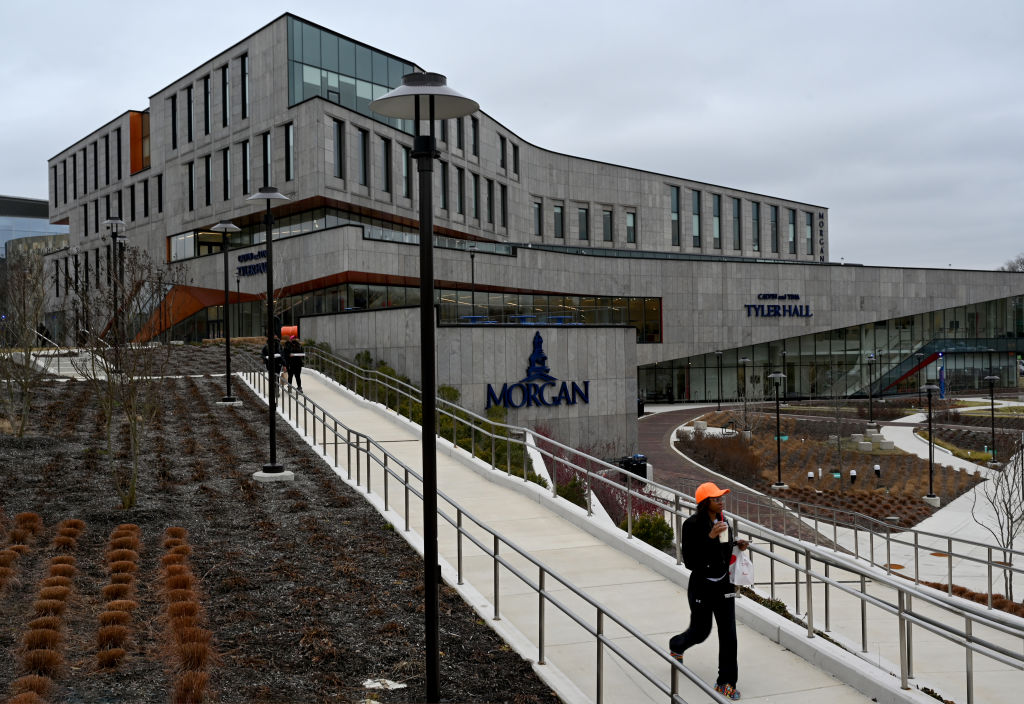Morgan State Shooting Follows HBCU Security Funding Calls
Prayers Up For Morgan State: Mass Shooting On Campus Follows Renewed Calls For Funding To Protect HBCUs

Morgan State University’s Tyler Hall shown on February 7, 2022, in Baltimore, Maryland. | Source: The Washington Post / Getty
Tuesday night’s mass shooting at a historically Black college in Baltimore came just about a month after another HBCU thwarted gun violence on that campus in an event that renewed calls for more federal funding to help protect and secure those campuses.
At least five people were shot at Morgan State University near a dormitory building. Amazingly, none of them are suffering life-threatening injuries, the Baltimore Sun reported. The victims have not been identified except for their ages ranging from 18 to 22 years old. The person or persons who opened fire had neither been arrested nor identified by law enforcement as of Wednesday morning.
Video footage posted to social media showed a massive police response that included heavily armed officers going door to door in an apparent dormitory building.
As a result, Morgan State announced early Wednesday morning that it was offering counseling resources and canceling all classes for the day “in the abundance of caution.”
The shooting came at the beginning of a week of homecoming festivities.
Immediate details were scarce about the possible motivation behind the mass shooting at Morgan State. It was also the third consecutive October that a shooting happened on Morgan State’s campus and the second time in many months that an HBCU was linked to such gun violence.
Most recently, a white supremacist drove onto the campus of Edward Waters University in Jacksonville, Florida, and was recorded by students wearing tactical gear before campus security removed him from school property on Aug. 26. After leaving, Ryan Palmeter opened fire at a nearby Dollar General store and killed three Black people before turning the gun on himself.
The unfortunate episode in Florida prompted Edward Waters University to decry a “lack of resources” at historically Black colleges and called on the Biden Administration to “do even more to secure our HBCU schools who are under deliberate and vicious attack.”
While Morgan State’s shooting has not been identified as being racist in nature, the underfunding of HBCUs has been well-documented.
Morgan State was also just last year the target of a series of bomb threats against dozens of HBCUs across the country.
Lodriguez V. Murray, UNCF’s senior vice president for public policy and government affairs, said in August that Congress hasn’t matched the urgency shown by the situation at hand.
“All year long, we have asked Congress to protect HBCUs, and now is the time to pass the Homeland Security appropriations bill with language that directs the Federal Emergency Management Administration (FEMA) to provide $100 million for HBCUs (annually) via the non-profit grants’ security program,” Murray said in a statement. “This program must administer the funds directly to HBCUs, not by the state governments. This will help HBCUs to be protected against threats by increasing security, developing plans on how to respond beyond simply calling the police, heighten the use of technology to monitor campus entry points, and make our environments the safe haven for learning they should be for the sake—and mental health and security—of our students.”
The U.S. Department of Education’s (DOE) Project SERV (Project School Emergency Response to Violence) initiative awarded more than $1 million in grants to HBCUs that were targeted and disrupted by racist bomb threats last year, the federal agency has said. Project SERV describes itself as specifically working to help institutions of higher learning affected by violent threats.
And while generous, those grants were split between four HBCUs, none of which included Edward Waters. In addition to using the grants for security, the four schools – Claflin University ($440,000), Delaware State University ($217,000), Howard University ($203,000) and Texas Southern University ($191,962) – all said they intended to use the funds to bolster wellness and mental health services needed following the bomb threats, not security.
The need to boost security on HBCU campuses made separate headlines in August when Howard University responded to a vicious melee that broke out near the HBCU’s residence halls. That instance of violence was also not described as race-related, but Howard still said it planned to install more than 1,000 cameras across campus, install card readers to control access to certain campus buildings, bolster its security with an armed officer stationed in front of residence buildings and supply students with an emergency device they can use to call for help.
Last year, Biden’s Administration made a $2.7 billion investment in HBCUs across the country from the American Rescue Plan. Of that total, Edward Waters received $13,228,709, according to the White House.
Statistics also show that federal funding of HBCUs has increased every year under Biden’s presidency.
A study from May found that HBCUs receive 178 times less foundation funding than Ivy League schools – $5.5 billion to $45 million in 2019, when the most recent statistics were available.
“The inequities are embedded and sanctioned by state governments, the federal government and by private industry,” N. Joyce Payne, founder of the Thurgood Marshall College Fund, told Forbes last year. “They say to the white schools, you can drive a Bentley, but the Black schools are told they can’t get a car at all.”
SEE ALSO:
Sean ‘P.Diddy’ Combs Pledges $1M To Jackson State University Athletics
Jacksonville HBCU Was Racist Gunman’s ‘Original’ Target, Edward Waters University Says

















